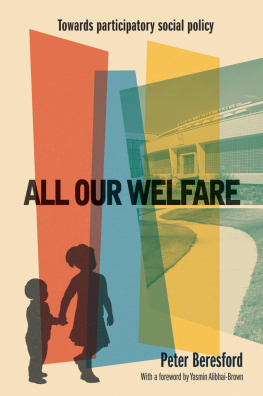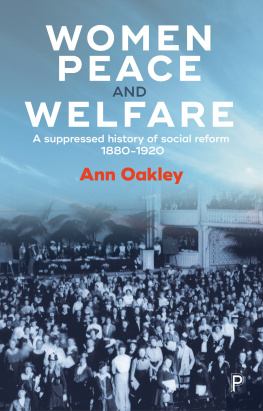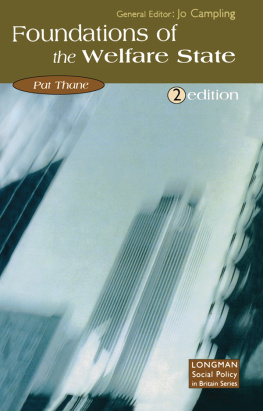Welfare Research
Welfare Research:
A Critical Review
Fiona Williams
Jennie Popay
Ann Oakley
First published 1999
by UCL Press
Published 2014 by Routledge
2 Park Square, Milton Park, Abingdon, Oxon OX14 4RN
711 Third Avenue, New York, NY, 10017, USA
Routledge is an imprint of the Taylor & Francis Group, an informa business
Fiona Williams, Jennie Popay and Ann Oakley, 1999
This book is copyright under the Berne Convention.
No reproduction without permission.
All rights reserved.
British Library Cataloguing-in-Publication Data
A CIP catalogue record for this book is available from the British Library.
Library of Congress Cataloging-in-Publication Data are available
ISBN 13: 978-1-857-28269-6 (hbk)
ISBN 13: 978-1-857-28270-2 (pbk)
Contents
Fiona Williams, Jennie Popay and Ann Oakley
Fiona Williams
Julie Seymour
Chas Critcher, David Waddington and Bella Dicks
Geraldine Macdonald
Jalna Hanmer and Jeff Hearn
Jeanette Edwards, Ann Oakley and Jennie Popay
Fiona Williams and Jennie Popay
This book is the result of many hours of discussion and debate amongst the seven research teams involved in The Management of Personal Welfare Research Initiative (MPWI). The Initiative was jointly funded by the ESRC and the Rowntree Foundation between 1990 and 1995. Two of the books editors, Jennie Popay and Ann Oakley, were co-ordinators of the MPWI. They developed the original proposal for this book and negotiated with publishers. Fiona Williams was commissioned to produce one of three literature reviews which were intended to stimulate intellectual debate across the projects in the Initiative. She subsequently became an active participant in the regular meetings of the Initiative and a co-editor of this volume.
The three literature reviewson the treatment of gender, structural inequalities and measurement issues in welfare research respectivelyformed a springboard for the ideas that bind this book together. These ideas were further developed at an International Seminar organized by the Initiative researchers in the Spring of 1993. In addition to this book on welfare research, the research conducted as part of the MPWI has contributed to a sister volume: Men, Gender Divisions and Welfare, edited by Jennie Popay, Jeff Hearn and Jeanette Edwards (Routledge 1998).
Many people have made this book possible. Our thanks go to the members of the MPWI Commissioning Group, and in particular to Janet Lewis, Margaret Edmonds and Alan Walker, who supported the funding necessary to sustain a participative co-ordination model for the MPWI and for the production of the literature reviews. Our publishers and contributors should also be thanked for their patience in the face of what may have appeared at times to be editorial inertia. This volume has taken some time to produce, partly because of the scale of commitments amongst our contributors; timetables have also been stretched as the editors have redrafted key parts of the text to keep up with a rapidly transforming public discourse and political context for welfare research, policy and practice.
Several of the chapters draw on data from the studies funded within the Initiative and our thanks go to the many respondents who made this research possible. The projects include: Responses to Contemporary Change in Britains Mining Communities, Chas Critcher et al. (X206252004); The Negotiation of Coping: Disablement, Caring and Marriage, Gillian Parker et al. (L206252002); Social Support and the Health and Welfare of Vulnerable Children: A Consumer Study, Ann Oakley et al. (L206252005); Social Support and the Health and Welfare of Vulnerable Children: A Provider Study, Jennie Popay et al. (X206252006); Violence, Abuse and the Stress-Coping Process: Project 1, Women, Jalna Hanmer and Project 2, Men, Jeff Hearn (L206252003).
As with all books, there are also many people who have made a direct, yet invisible, contribution to the production process. These include the administrative staff of our various workplaces, with particular thanks to Carla Warburton for her endless fortitude chasing up and editing numerous drafts, and Gill Fernley, Nicola Doyle and Chris Saunders for various contributions without which the manuscript would not have been completed.
Fiona Williams, Jennie Popay and Ann Oakley
Chas Critcher is Professor of Communications in the Communication, Media and Communities Research Centre at Sheffield Hallam University. He has been researching mining communities for more than a decade. He is the coauthor, with David Waddington, of Flashpoints: Studies in Public Disorder (London: Routledge, 1989) and Split At The Seams: Community, Continuity and Change after the 19845 Coal Dispute (Buckingham: Open University Press, 1991) and co-edited with David Waddington Regeneration of the Coalfield Areas: Anglo-German Perspectives (London: Pinter, 1995). His other research interests include popular culture and the mass media. He is currently embarking on a study of moral panics about social problems.
Bella Dicks is Lecturer in the School of Comparative and Applied Social Science at the University of Wales, Cardiff, at the School of Social and Administrative Studies. She is currently completing a PhD on heritage and locality based in the Rhondda Valleys. Her current research project is examining the authorizing of ethnographic texts through multi-media. Her research interests focus on locality and the representation of class, community and industry. She has published articles relating to coalmining communities in Yorkshire and Wales.
Jeanette Edwards is Lecturer in Social Anthropology, and director of the MSc in medical social anthropology at the University of Keele. One of her research interests is in kinship, and in particular, cultural understandings of parenthood in late twentieth century Britain. She is co-author with Franklin, Hirsch, Price & Strathern of Technologies of Procreation: Kinship in the Age of Assisted Conception (Manchester: Manchester University Press, 1993) and author of several articles on relatedness and new reproductive technologies, and the views of community health and social service providers on the needs of women and their children.
Jalna Hanmer is Professor of Womens Studies and Director of the Research Centre on Violence, Abuse and Gender Relations at Leeds Metropolitan University. She is currently researching a new approach to policing repeat victimization of women by known men. Her publications include Well-Founded Fear (co-authored with Sheila Saunders, London: Hutchinson, 1984); Women, Violence and Crime Prevention: A Community Study in West Yorkshire (co-authored with Sheila Saunders, Aldershot, London: Gower, 1993); Women, Violence and Social Control (co-edited with Mary Maynard; London: Macmillan, 1987); Women, Policing and Male Violence: International Perspectives (co-edited with Jill Radford and Elizabeth Stanko, London: Routledge, 1989) and Women and Social Work: Towards a Women-Centred Practice (co-authored with Daphne Statham, London: Macmillan, 1988).
Jeff Hearn is Professorial Research Fellow in the Faculty of Economic and Social Studies, based in the Department of Social Policy and Social Work, University of Manchester, and Visiting Professor in Sociology at bo Akademi University, Finland. His publications include










